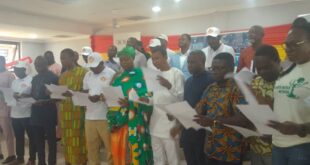Deputy Finance Minister, Dr. John Kumah, has said that he has no doubt Ghanaians will retain the New Patriotic New (NPP) in the next elections, given the economic achievement of the Nana Addo Dankwa Akufo-Addo led government.
He explained that Ghanaians will vote for the NPP over the National Democratic Congress (NDC) should they compare the economic performance of the governments led by the nation’s two leading political parties.
“I think the Ghanaian voter will be better positioned to compare these variables and see which of these two governments has done better in their eight years … If you compare our track record on the economy, I don’t doubt that Ghanaians would give another term to the NPP government,” myjoyonline.com quoted him.
The deputy minister, who is also the Member of Parliament (MP) for Ejisu, said that a proper interpretation of the Economic Intelligence Unit (EIU) Report implies the NDC will lose the 2024 General Election.
“Depending on whichever way you interpret this prediction, EIU will be the winner in the end. So what they are saying is that NDC has a high possibility of winning, but the caveat is that they must change President Mahama.
“That is like telling the camel to enter into the eyes of a needle. What I can confidently tell you is that looking at the standards that they refer to – the economy, corruption, slow governance, job creation – for me, these are very key elements that they touched on… NDC will lose the elections per this arrangement,” he said.
The EIU, in its five-year forecast for Ghana released on April 13, 2022, said that the opposition party, NDC, has a higher probability to be victorious in the next general elections.
However, the EIU noted that the NDC should revitalize its prospects with a flagbearer other than former President John Dramani Mahama.
Also, the report said that the government under President Nana Addo Dankwa Akufo-Addo is faced with numerous challenges, including unemployment, an economic downturn, and corruption among others which will fuel citizens’ sentiments against the governing party.
“Our baseline forecast is that ongoing public dissatisfaction with the slow pace of improvements in governance-such as infrastructure development, job creation and easing of corruption-will trigger anti-incumbency factors and push the electorate to seek a change,” the EIU report stated.
 Home Of Ghana News Ghana News, Entertainment And More
Home Of Ghana News Ghana News, Entertainment And More





